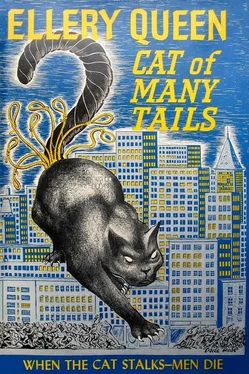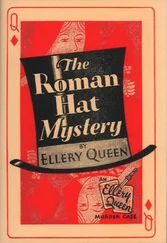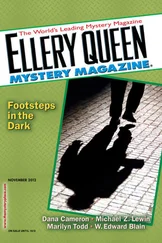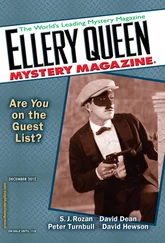She looked down at her white doeskins, blinking angrily.
The Queens kept looking at her.
“I’m really awfully, terribly sorry,” said a voice, “but I rang and rang—”
Celeste jumped up and ran to the window. A long wrinkle ran like a crack from one shoulder to the opposite hip and the young man in the doorway seemed spellbound by it. As if he half-expected a shell to fall off.
He said again, “I can’t tell you how sorry,” not taking his eyes from her back, “but I lost a sister by that route myself. I’ll come back later.”
Celeste said, “Oh!” and she turned around quickly.
They stared at each other across the room.
Ellery said, “Miss Phillips and — I gather — Mr. McKell.”
“Ever see New York the way it’s going to look the day after God Almighty strikes us all dead because He’s sick and tired of us? — I mean, Wall Street on Sunday morning?” Jimmy McKell was saying to Celeste Phillips ten minutes later. As far as he was concerned, the Almighty had already begun, with the Queens. “Or Big Liz coming up the bay? Or the mid-Hudson from the Yonkers ferry in June? Or Central Park from a Central Park South penthouse looking north any old time? Ever taste a bagel? Halvah? Chopped liver with chicken fat and a slice of black radish? Shish kebab? Anchovy pizza?”
“No,” said Celeste primly.
“This is ridiculous.” He waved his absurd arms. He looks like young Abe Lincoln, thought Ellery. All length and enthusiasm, awkward and lovely. An ugly, humorous mouth and eyes not so frank as his voice. His brown suit was positively disreputable. 25 or 26. “And you call yourself a New Yorker, Celeste?”
Celeste stiffened. “Maybe, Mister McKell, being poor all my life has something to do with it.” She has the French heritage of middleclass propriety, Ellery thought.
“You sound like my saintly father in reverse,” said James Guymer McKell. “He never ate a bagel, either. Are you anti-Semitic?”
“I’m not anti-anything,” gasped Celeste.
“Some of my father’s best friends are anti-Semitic,” said young McKell. “Listen, Celeste, if we’re going to be friends you’ve got to understand that my father and I—”
“I’ve got my own tender heart to thank for this,” said Celeste coldly. “That and the fact that my sister—”
“And mine.”
She said, flushing, “I’m sorry.”
Jimmy McKell flung a grasshopper leg up and over. “I live on a legman’s stipend, my girl, and not because I like it, either. It’s that or go into oil with my father. I wouldn’t go into oil if I was — if I was a Portuguese sardine.”
Celeste looked suspicious but interested.
“I thought, McKell,” remarked the Inspector, “that you lived with your people in that Park Avenue museum.”
“Yes,” smiled Celeste. “How much board do you pay?”
“Eighteen bucks a week,” said Jimmy, “just about enough to buy the butler’s cigars. And I don’t know that I’m getting my money’s worth. For my silken flop, with running hot toddies, I have to take long sermons on class distinction, a Communist in every garage, how we must rebuild Germany, what this country needs is a Big Businessman in the White House, my-boy-marry-into-Steel, and that grand old favorite, The Unions Be Damned. The only reason I stay to take it is that I’m kind of sentimental about my mother. And now that Monica...”
“Yes?” said Ellery.
Jimmy McKell looked around. “What? Say, I’ve kind of forgotten what I came for, haven’t I? It’s that old debbil sex again. Pin-up GI McKell, they used to call me.”
“Tell me about your sister,” said Celeste suddenly, pinching her skirt forward.
“Monica?” He pulled a cigaret with the texture of a prune from his pocket, and a large match. Celeste covertly watched him light up and lean forward in a jackknife, one eye cocked against the smoke, his elbows on his shanks and an overgrown hand tossing the match stump up and down. Jimmy Stewart and Gregory Peck, Celeste thought. And — yes — the teeniest dash of Raymond Massey around the mouth. Young-wise and boy-old. Homely and sweet. Probably had every woman in New York running after him. “A good joe. Everything they said about Monica was true, yet they never got to know her. Least of all father or mother. It was her own fault; she was misery-misery-misery inside, and she put up a front to cover it that was tougher to get through than a tank trap. Monica could be mean, and cruel, and toward the end she was getting worse.”
He tossed the match into an ashtray. “Father had always spoiled her rotten. He taught her what power was and he gave her his own contempt for people. His attitude toward me’s always been different; he made me toe the line from the start. We used to have some pretty rough times. Monica was a grown woman when I was still in knee pants, and it was Monica who slugged it out with father in my defense. He never could stand up to Monica.
“Mother was always afraid of her.”
Jimmy hooked a garter-revealing leg over the arm of the chair. “My sister grew up — as long as you’re asking — without a slum kid’s chance to find out what she really wanted out of life. Whatever it was, it wasn’t what she had, and that’s what made my father into an even meaner old man than he’d ordinarily have been, because in his view she had everything. I found out by spending three years in the Army as a dough-foot, two of them crawling around the Pacific mosquito parks on my belly. Monica never did find out. The only outlet she had was kicking the rules in the pants. And all the time, underneath, she was scared and mixed up... It’s a funny deal, Celeste,” said Jimmy suddenly, staring at her.
“Yes... Jimmy?”
“I know a lot about you.” She was startled at that. “I’ve been covering the Cat cases since the Abernethy murder — I get special privileges at the Bastille because they find me useful for dirt-digging purposes in the upper crust. I actually talked to you after your sister was murdered.”
“You did? I didn’t...”
“Naturally, I was just one of the vultures, and you were pretty numb. But I remember thinking at the time that you and I had a lot in common. We were both way out of our class and we both had sisters who were cripples and whom we loved and understood and who got the same nasty, sickening deal.”
“Yes.”
“I’ve been meaning to look you up when you’d had a chance to unpack the bags under your eyes and get your defenses up a little. I was thinking about you when I walked up those stairs.”
Celeste looked at him.
“Cross my heart and hope to die in the oil business.” Jimmy grinned, but only for an instant. He turned abruptly to Ellery. “I run off at the mouth, Queen, but only when I’m with fellow-workers. I’m a great lover of humanity and it comes out here. But I also know how and when to button up. I was interested — as a reporter — when Abernethy, Violette, and O’Reilly were knocked off; when my own sister got it, it got personal. I’ve got to be on the inside in this cat race. I’m no boy genius, but I’ve learned to toddle around this town and I think you can use me. If my newspaper connection rules me out, I’ll quit today. Myself, I think it’s an advantage; gives me entree I wouldn’t have otherwise. But that’s strictly up to you. Maybe before you say no I ought to go on record before witnesses that I wouldn’t write anything for that lousy bedsheet I work for that you nixed. Do I get the job?”
Ellery went to the mantelpiece for a pipe. He took a long time filling it.
“That makes two questions, Mr. Queen,” said Celeste in a tense voice, “you haven’t answered.”
Inspector Queen said, “Excuse us a minute. Ellery, I’d like to talk to you.”
Читать дальше












